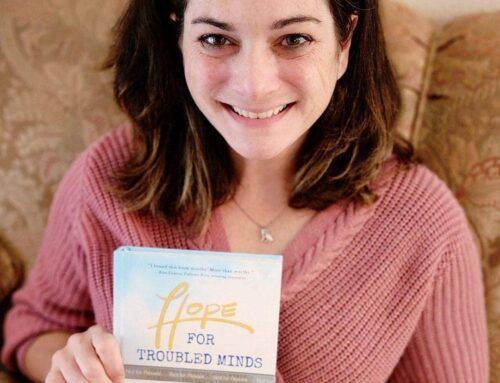Some time ago I met a woman who was deeply distraught. She had been diagnosed with major depression and sometime ago was prescribed anti-depressants. They worked very well and she came to enjoy a period of relative stability. Then she and her husband decided to start a family. Leery of the impact of psychotropics on her developing child, she spoke with her psychiatrist who agreed to wean her off her meds.
At first she felt good as she launched into the journey toward motherhood. Then months past. A year. Two years. No baby. And the demon of depression returned with a vengeance. She found it difficult to work, to enjoy time with her husband, even to concentrate on simple household tasks. She had made room in her heart for a child and now it was filled with sorrow.
What can she do?
I asked this to some friends and one woman wrote back,
I took Paxil, all through my pregnancy, and during the whole time I breastfed. My child is healthy and very intelligent, so I feel I did the right thing with continuing treatment the whole time.
This prompted me to wonder,
How dangerous are psychotropics to children in the womb or breastfeeding?
So I decided to do some research. First, I need to stress strongly that no article, opinion, or story you hear from others should replace the expert counsel of your psychiatric care giver, who takes into account all the factors of your health and the health of a child you might one day bear.
If you are taking psychotropics and want to get pregnant, consult a knowledgeable psychiatrist or psychiatric nurse practitioner.
Having said this, understand no two psychotropic meds are alike, just as no two persons diagnosed with a mental illness are. Some meds are safer than others. Some meds are more dangerous for some people than others. Carefully prescribed psychotropics are not the same as drugs such as nicotine, alcohol, and street drugs. These should be avoided at all costs during pregnancy and breastfeeding. For psychotropics, a more careful cost vs. benefit analysis need be done. If you are a woman with a mental illness who stops taking her meds, the impact on your child emotionally and behaviorally may actually be more detrimental than if you continued taking them.
What about particular mental illnesses and the medicines often prescribed for them? Jane Collingwood wrote an article called called “Pregnancy and Psychotropic Medication” at Psych Central. Here are some of Collingwood’s conclusions:
… in the case of bipolar disorder, relapse is often due to the discontinuation of preventive drugs. Although mild manic episodes can often be managed without drugs, severe manic episodes need to be treated because the possible consequences of injury, stress, malnutrition, profound sleep deprivation and suicide could pose more risk to the fetus than the side effects of the drug.
For generalized anxiety disorder and panic disorder, low-risk medications are available. As an alternative to drugs, patients should be offered cognitive behavioral therapy or psychotherapy, as should those with obsessive-compulsive disorder or post-traumatic stress disorder.
“If a patient becomes pregnant while taking paroxetine, she should be advised of the potential harm to the fetus. Unless the benefits of paroxetine to the mother justify continuing treatment, consideration should be given to either discontinuing paroxetine therapy or switching to another antidepressant.” Antidepressant medications cross the placental barrier and may reach the fetus, but research has shown that most other SSRIs are safe during pregnancy. Birth defects or other problems are possible, but they are very rare.
Benzodiazepines should not be used during pregnancy, particularly in the first trimester, as they may cause birth defects or other infant problems. The U.S. Food and Drug Administration has categorized benzodiazepines into either category D or X meaning potential for harm in the unborn has been demonstrated. If used in pregnancy, benzodiazepines with a better and longer safety record, such as diazepam (Valium) or chlordiazepoxide (Librium), are recommended over potentially more harmful benzodiazepines, such as alprazolam (Xanax) or triazolam (Halcion).
Collingwood gives the final word to the National Institute of Mental Health,
Decisions on medication should be based on each woman’s needs and circumstances. Medications should be selected based on available scientific research, and they should be taken at the lowest possible dose. Pregnant women should be watched closely throughout their pregnancy and after delivery.
Discover more from Delight in Disorder
Subscribe to get the latest posts sent to your email.







